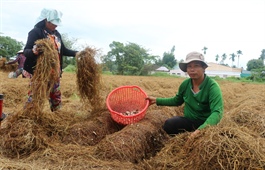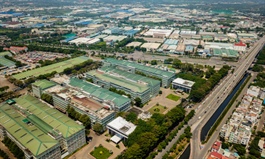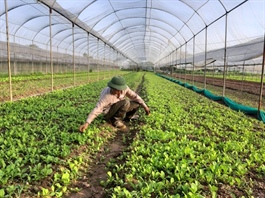Vietnam in need of national strategy for veggie exports to EU
Vietnam in need of national strategy for veggie exports to EU
Vietnam currently makes up 1% of total EU imports of vegetables and fruits.
Vietnam is in need of a national strategy for exporting vegetables and fruits to the EU so that the country could better take advantage of the EU – Vietnam Free Trade Agreement (EVFTA) and gain greater shares in this important market.

Overview of the online conference. Photo: Hai Yen |
Minister of Agricultural and Rural Development Le Minh Hoan gave the remarks at an online conference discussing the prospects of exporting vegetables and fruits from Vietnam to the EU today [October 26].
According to Hoan, every year, the EU imports around US$40 billion in vegetables and fruits, in which Vietnam makes up less than 1% of that figure.
“Such a number remains modest given the fact that Vietnam has already had in place a trade deal with the EU compared to other major exporters of farm produce in Asia, in Latin America or Africa,” Hoan added.
The minister suggested a long-term strategy with the participation of ministries, provinces/cities, and Vietnamese embassies in Europe would help address a range of issues that the local agricultural sector is facing in going global, on how to develop concentrated production areas in an efficient way, deal with logistics issues or update on changes in customer preferences.
Besides product quality, Hoan noted social responsibilities and green consumption should be the way for Vietnamese enterprises to focus on convincing European customers.
“Vietnam should promote the image of an agricultural sector that is transparent, environmentally friendly, and responsible,” he added.
Sharing Hoan’s view, the Vietnamese Ambassador to Belgium and the Head of the Vietnamese Delegation to the EU Nguyen Van Thao noted Vietnam needs a consistent and long-term approach for the whole EU, instead of a single country, from an early stage of production to packaging and distribution.
Thao considered Hoan’s proposal of a strategy for exporting vegetables and fruits to the EU as part of an overall economic plan in the post-pandemic period, in which the agricultural sector with huge potential should spearhead the recovery process.
“With the people and enterprises staying central in the recovery process, Vietnamese embassies and missions abroad are committed to continuing cooperating with local provinces/cities in working on an overall plan to support Vietnamese farm produce penetrating the European market,” Thao said.
Tran Van Cong, Vietnam’s agricultural counselor in Europe, noted for the first eight months of 2021, Vietnam’s export turnover of vegetables and fruits to the EU rose by 7.7% year on year to $103 million, mainly dragon fruits, passion fruits, durian, and jack fruits.
“Given growing demand from the EU for tropical and processed fruits, Vietnam has huge potential to further expand its market share in the region,” said Cong.
Cong, however, noted inconsistency in product quality, high transportation cost, and long-distance travel are among issues affecting the competitiveness of local farm produce.
“A lack of understanding on technical specifications from the EU market is putting Vietnamese enterprises at risk of potential trade disputes,” he added.
Cong called for the Vietnamese Government to provide greater incentives for local businesses in applying technologies in production, preservation to better meet demands from strict markets.
“Lowering logistics costs and using technologies for origin tracing is essential for Vietnamese agricultural products to have a chance and compete in the EU markets,” he said.























